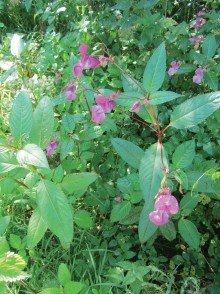Dorset Wildlife Trust (DWT) is urging local communities to work together to help stop the spread of invasive Himalayan balsam, which smothers and destroys native plants such as purple loosestrife and meadowsweet.
Himalayan balsam is native to West and Central Himalayas. It grows very quickly and is renowned for its pink trumpet-shaped flowers and hollow green stems. It can be found along river banks and other wetland areas.
DWT is encouraging those who live near streams and rivers to pull out and uproot any Himalayan balsam plants that are on owners’ land to help take action and help conserve our river beds and native plants for future generations.
DWT Trainee Conservation Officer, Ali Quinney said: “Himalayan balsam is causing havoc along many Dorset Rivers, and is a contributing factor to the erosion of our river banks, as well as destroying habitats for creatures such as the water vole. When it flowers, its seeds literally explode, making stopping its spread a very challenging task.It has very shallow roots which make it extremely easy to remove; just hold it firmly at the base and gently pull, making sure all the roots are out of the ground, and then dispose by burning or composting them.”
DWT and partner organisations* have already started managing rivers for invasive species with the ‘Return of the Natives’ project, which has dramatically halted the spread of Himalayan balsam on the Bere Stream and River Hooke. However, with the flowering season about to begin, it is vital that we act now to stop the problem worsening across the rest of Dorset.”
Himalayan balsamis categorised as a ‘non-native invasive plant’ and therefore if any of us have any growing on our premises we have a legal responsibility to prevent them spreading into the wild or causing a nuisance. For more information about how you and your community can contribute to the conservation of your local river, contact Ali Quinney at Dorset Wildlife Trust on [email protected] or phone 01305 264620.
For more information about Himalayan balsam, visit https://www.nonnativespecies.org/factsheet/factsheet.cfm?speciesId=1810







